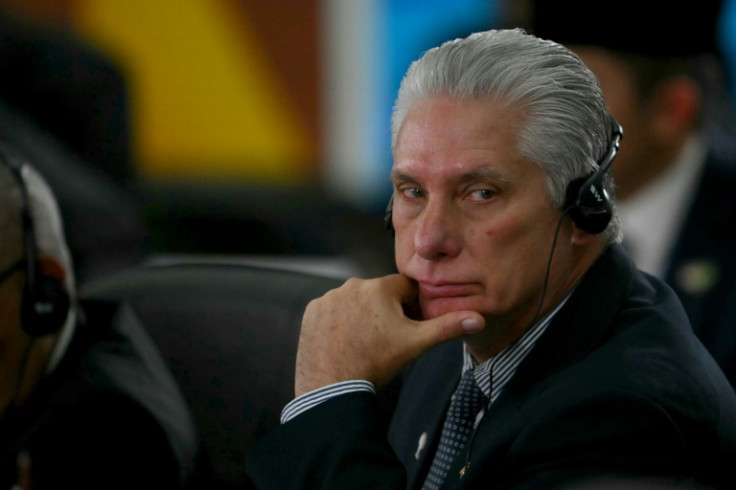US Sanctions Cuban President Four Years After Historic Protests

The United States announced its first sanctions on Friday against Cuban President Miguel Diaz-Canel for his role "in the Cuban regime's brutality toward the Cuban people."
It is the latest in a series of measures by US President Donald Trump's administration to increase pressure on the Cuban government.
The United States was restricting visas for the Cuban president and other high-ranking government officials, Secretary of State Marco Rubio said in an X post on the fourth anniversary of historic anti-government protests in Cuba.
Demonstrations rocked the island in July 2021 as thousands took to the streets to protest shortages of basic goods and worsening economic conditions.
Hundreds were arrested, one person died and dozens were injured in the lagest protests since Fidel Castro's 1959 communist revolution.
The State Department said it was sanctioning "key regime leaders... for their involvement in gross violations of human rights."
Officials sanctioned included Defense Minister Alvaro Lopez Miera and Interior Minister Lazaro Alberto Alvarez Casas.
The United States was also taking steps to sanction Cuban judicial and prison officials linked to the "unjust detention and torture of July 2021 protestors."
"While the Cuban people suffer shortages of food, water, medicine, and electricity, the regime lavishes money on its insiders," Rubio said.
Cuban Foreign Minister Bruno Rodriguez slammed the measures on X, saying the United States cannot "bend the will of its people or its leaders."
In May, the Cuban foreign ministry summoned the US envoy to Havana to protest his "interference" in the country's internal affairs.
The United States has a six-decade-old trade blockade in place against Cuba.
Rubio took to X to accuse Cuba of torturing dissident leader Jose Daniel Ferrer and demand "proof of life."
"The United States demands immediate proof of life and the release of all political prisoners," Rubio said.
According to the United States, 700 people are still imprisoned for taking part in the July 2021 protests. Human rights organizations put the number at between 360 and 420.
Some of the convicted protesters have been released in recent months after serving their sentences.
Others, including Ferrer -- leader of the dissident group Patriotic Union of Cuba (UNPACU) -- were released as part of a Vatican-mediated agreement in January after former US president Joe Biden removed the island from the blacklist of countries sponsoring terrorism.
But at the end of April, Ferrer's parole was revoked, prompting criticism from Washington, which has put Cuba back on the blacklist after Trump returned to power.
The State Department also added the "Torre K," a 42-story hotel in Havana, to its restricted list of entities off-limits to Americans, "to prevent US dollars from funding the Cuban regime's repression."
The establishment, recently inaugurated in a central area of the Cuban capital, sparked criticism of the government's huge investment in new hotels at a time when tourism is declining.
© Copyright AFP {{Year}}. All rights reserved.





















